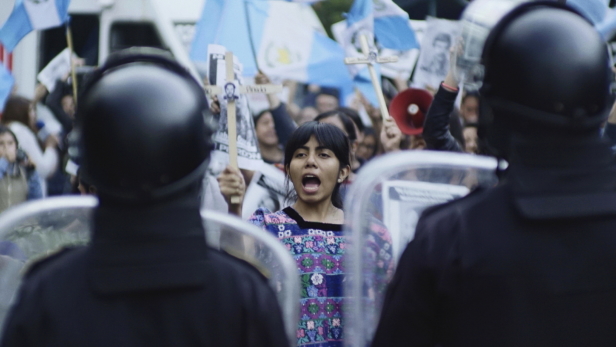Poetic justice is served up in Jayro Bustamante’s supernatural drama about the mass killing of Mayan citizens carried out during the Guatemalan civil war. Using a twist on the legend of the weeping woman Bustamante blends damning courtroom testimony with haunting imagery to confront real-life horrors such as rape and the cold-blooded murder of children. Though no one involved in the conflict is directly named there are similarities to the case of former dictator José Efraín Ríos Montt whose conviction for genocide was overturned in 2013.
General Enrique Monteverde (Julio Diaz) retreats to his grand and heavily guarded home after his guilty verdict is quashed, he’s joined by his wife Carmen (Margarita Kenéfic), daughter Natalia (Sabrina De La Hoz), granddaughter Sara (Ayla-Elea Hurtado) and the only servant who has stuck by his side, Valeriana (María Telón). Outside passionate protestors gather and a new maid turns up in the form of Alma (the impeccable María Mercedes Coroy), a striking Guatemalan woman with knee length black hair and a hardened stare.
From the very start, Bustamante strikes a creepy ambience as a pale woman with shocking white hair and black kohl lined eyes carries out a ritual. The woman is Carmen and as the camera pans out you meet the rest of the Monteverde clan who are praying that the General doesn’t get sent down. The film continually calls out Carmen’s cold attitude to the conflict and her complicity in her husband’s violent actions. At the same time, it points the finger at multiple generations that have failed to provide justice for the Mayan population.
There’s lots to unpack in the arresting imagery Bustamante conjures up as the General begins to hear wailing and hallucinate ghostly figures. Through the haunting the film cannily directs the humiliation and torment the Mayans suffered onto the people who carried it out. Though some of the conversations about culture and violence give too much away about what’s really going on the oppressive, melancholic ambience effectively evokes deep sadness and anger. On only his third outing as a director Bustamante delivers one of the most powerful depictions of the legend of La Llorona in film as he fearlessly wades through distressing recent history.
